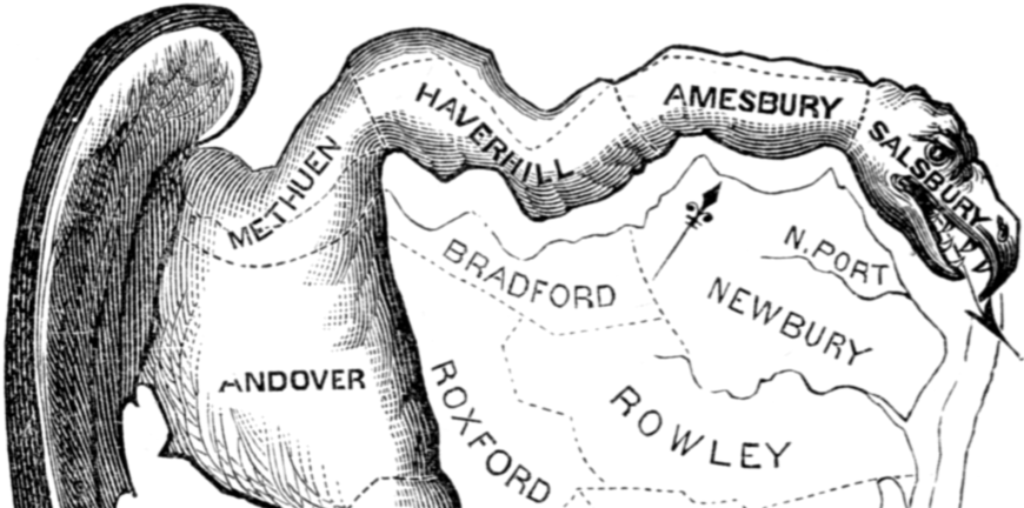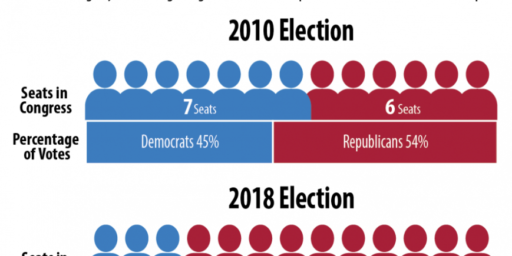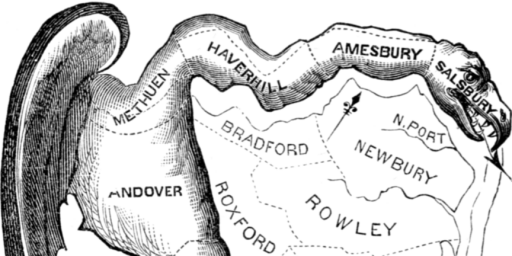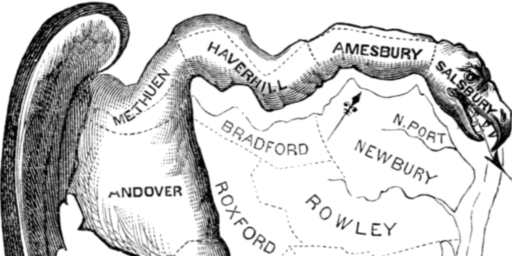New Jersey Democrats Want To Enshrine Gerrymandering In State Constitution
Gerrymandering. It's not just for Republicans.

New Jersey Democrats have had quite a good two years, in addition to winning the Governor’s mansion back in 2017 and nearly sweeping the state’s Congressional Districts while also re-electing the most ethically challenged Senator in the country, they also have a larger margin in the state legislature than they did in the Chris Christie era. Now, they’re seeking to use that power to consolidate their power even more:
Legislative power brokers across the country have long designed district lines in back-room deals that entrenched their control for years, if not decades. But now, Democratic lawmakers in New Jersey are carrying out a power grab in an unusually public fashion: They are seeking to make Republicans a permanent minority by essentially writing gerrymandering into the State Constitution.
The New Jersey plan comes amid a national reckoning over the consequences of gerrymandering and has been met by fierce opposition across the political landscape — and not just from Republicans and nonpartisan watchdog groups.
Even some national Democratic leaders have criticized the plan, fearing that it undercuts Democratic efforts to attack what they term Republican strong-arm tactics in states capitals across the country. Republicans in Wisconsin and Michigan are facing an intense backlash after state legislatures there voted to strip power from newly elected Democratic governors.
Republicans have also come under fire for legislative gerrymandering in states like North Carolina.
Eric H. Holder Jr., a former attorney general under President Barack Obama and a potential presidential candidate in 2020, called on the Democratic lawmakers in the New Jersey Legislature, who have significant majorities in both chambers, to rethink their plan.
(…)
The Democratic lawmakers’ proposal would amend the New Jersey Constitution, and New Jersey voters would need to approve it through a ballot measure.
It overhauls the makeup of a redistricting committee to give more power to legislative leaders. It also establishes a “fairness test” requiring district maps to reflect how major political parties perform in statewide elections for governor, senator and president.
In New Jersey, which has not elected a Republican senator since 1972 and where registered Democrats outnumber Republicans by nearly 1 million voters, that standard ensures that the redistricting process would begin on an uneven playing field. (New Jersey did elect a Republican governor in 2013, but the state has been trending Democratic.)
“It institutionally strips away the will of the voter,” said Tom Kean Jr., the Republican leader in the Senate. “The will of the Republicans and unaffiliated voters in New Jersey would be ignored to the benefit of incumbent majority party legislators forever more.”
Proponents of the plan, Stephen M. Sweeney, the senate president, and Nicholas P. Scutari, a co-sponsor of the bill, argue that the redistricting process is too often conducted behind closed doors by unelected officials and where deals are hashed out without any voter input.
By putting their plan before the electorate, supporters argue, New Jersey Democrats are letting voters decide how redistricting should be done.
“There’s nothing gerrymandering about it,” Mr. Scutari said. “If we have a significant advantage in voters, then you’re going to have a significant difference in legislative districts. If you took this matrix of guidelines and put it in Texas, you’d probably get significantly more legislative districts that favored Republicans.”
Democrats, who have scheduled a hearing on the proposal on Thursday, are turning to an obscure legislative maneuver just to try to put the proposal on the ballot.
Typically, a proposed constitutional amendment requires a three-fifths majority in the state legislature before it can get on the ballot. But since no Republican supports the redistricting plan, it seems unlikely that it would ever succeed in either chamber in Trenton.
Instead, Democratic leaders are digging deep into the state’s laws and using a provision allowing an amendment that passes the state legislature with a simple majority in two consecutive calendar years to be placed on the ballot.
Democrats have scheduled a vote on the redistricting plan for Monday, the final day the legislature is to meet this year. Then they are likely to bring it up again in early January, satisfying the two-year requirement in less than a month. Should the measure pass in both instances, the proposal could be put on the ballot in November.
The quick procedural move, in particular, has provoked an outcry, including from Gov. Philip D. Murphy. Though Mr. Murphy is a Democrat, the redistricting plan would greatly weaken his ability to influence the process.
“I have as much a concern about the process as I do even about the substance,” Mr. Murphy said. “I don’t like the substance, but this is classic jam something through, and I got elected to stand up against that and I’m going to.”
The plan makes significant changes to the way the state’s redistricting commission is established. Currently, the Republican and Democratic state party chairs each nominate five people to the redistricting board, and the state Supreme Court selects someone to serve as the tiebreaker. Mr. Murphy is closely allied with the chairman of the Democratic state party, John Currie, giving the governor sway over some of the commission’s members.
The redistricting plan would increase the size of the commission by two members, to 13, and state party chairs would only be allowed two nominees each. The senate president, senate minority leader, assembly speaker and assembly minority leader would each get to nominate two members, at least one of which must be a state legislator.
The notion of including legislators on panels that draw legislative districts runs counter to what many advocates for redistricting reform are demanding and the approach that other states are taking.
But the main criticism of New Jersey’s plan centers on setting the benchmark for drawing districts based on statewide election results.
The proposal says that at least 25 percent of legislative districts must be “competitive,” meaning that they must be within five percentage points of the statewide average based on the results for president, senator and governor in the past decade. That formula would likely result in a Democratic statewide advantage of 55 percent, according to a study by the Princeton Gerrymandering Project at Princeton University.
In effect, competitive districts could still have Democratic majorities of as much as 60 percent.
“The map becomes permanently slanted,” said Patrick Murray, the director of polling at Monmouth University. He noted that of the state’s 40 legislative districts, at least 25 would have to be majority Democratic under the redistricting proposal.
“It’s the exact opposite of where the reform movements are going right now,” Mr. Murray added. “Not only are they using formulas to give one party an advantage over another, but they’re actually moving away from considering political metrics in their drawing of districts. That includes past vote, voter registration, where incumbents live and a whole host of other things. So this is even a step backward from what the national Democrats are doing.”
The advantage of writing these redistricting rules into the Constitution, of course, is that it would make it far more difficult for future legislatures to change the rules back to the current status quo or to something that would arguably be aimed at drawing fair districts that did not benefit one party over another. While most of the attention in recent years when it comes to gerrymandering and voter suppression has been focused, justifiably so, on efforts in states controlled by Republicans such as North Carolina, Wisconsin, and Texas, to protect incumbents and limit the powers of political minorities, it should not come as a particular surprise that in this case it’s Democrats who are seeking to limit voter choices and enhance their hold on power shouldn’t be all that surprising. As the old saying goes, power corrupts, and absolute power corrupts absolutely and, for the moment at least, Democrats in New Jersey have absolute power and they are obviously attempting to use it to not only gerrymander the state even more than it already has been, but to enshrine the process that would make it easier to do so in the state Constitution in a manner that bypasses the normal procedure for Constitutional Amendments. If they were so confident that what they were doing was right, they obviously wouldn’t be doing this.
Fortunately for New Jersey, there are still some opportunities to stop this process before it becomes set in stone. The fact that Governor Murphy opposes the plan and the process by which it is being considered is significant, and while it’s unclear how much power he actually has to stop the process the fact that he is speaking out against it is a good sign and perhaps will give Democrats who actually have a conscience the reason they need to resist what the leadership is trying to do. Second, even if the measure passes the legislature it will still need to be approved by voters at a General Election, presumably the 2020 election although it could end up on the 2019 ballot. At that point, it will be up to people of good conscience to educate the public about what might seem like an inconsequential Constitutional Amendment but which really amounts to an unparalleled power grab by Garden State Democrats.





Not sure the bill matches the headline or your take, Doug. The substantive description of what the bill does is two-fold:
#1
#2
First one may be objectionable but it isn’t gerrymandering.
Second one would seem to be aimed at preventing a WI or NC situation wherein actual gerrymandering results in a massive disparity between state-wide proportional votes and actual representation in the legislature.
Now this is not to say that Dems don’t also gerrymander (I live in a horrifically gerrymandered district in MD) but unless there is more that you or the NYT writers aren’t sharing, I’m not sure why the principal that representation should roughly match voter’s choices is called gerrymandering…
@SKI:
The primary error in your comment is the idea that statewide partisan balances should be relevant to how the lines of how specific districts are drawn. That kind of rule essentially guarantees that the minority party will be shut out from having a fair shot at winning districts since they would all be drawn to mirror the statewide balance.
Like many states, New Jersey is not a state where every area of the state is an exact ideological mirror of the statewide balance. As such, that statewide number should not be relevant in drawing district lines.
Also, putting more power in the hands of majority party leadership guarantees a more partisan balance when district lines are drawn.
And, of course, the final objection is that this is not something that should be enshrined in the Constitution, thus making it doubly difficult for voters and legislators in the future to change the law.
All states need to implement something very like the Arizona Independent Redistricting Commission.
All votes should count.
@Doug Mataconis:
All of which are very valid *policy* objections to the proposed bill/amendment. And I don’t disagree with any of them.
What they aren’t is evidence that the amendment will “Enshrine Gerrymandering In State Constitution.” Which is my point.
I feel that Independent Commissions can become quite partisan under the right circumstances, and given a certain determination by some individuals to make it so.
I would like to see us refine a fairness test for districting that is statistical in nature. I think we are getting close to being able to do that, with the ideas of “voter efficiency” floating around.
Now, it is possible that opponents to the use of “voter efficiency” ideas to evaluate districts could frame those ideas as partisan. Is this happening in NJ? Or, is the legislature trying to game people’s sense of fairness into advantage for Democrats? I have no idea, and I can’t tell from what is written in the NY Times, which shuns statistical analysis in favor of “he said, she said”.
I wish to point out that when one estimates voter efficiency, one must make an estimate of the number of voters of each party in each precinct. Typically this is done by looking at the most recent presidential vote in that precinct, and how it related to the overall statewide vote. If you look at a couple of these, you can get an estimate not just of the percentage, but of how strongly it moves when the statewide vote moves.
This is the statistical basis of “voter efficiency”, which is probably the strongest basis we have available for assessing fairness or lack of fairness. And it very much depends on looking at the presidential vote, while recognizing that not all precincts have the same proportion of R/D voters.
So, again, I can’t tell if that is what is going on in NJ or not from the article, because nobody wants to talk about statistics.
@SKI:
They are enshrining a redistricting scheme that allows a legislative majority to engage in blatant partisan gerrymandering in the Constitution of New Jersey by passing it as a proposed Amendment rather than a simple change in the law. This will make it harder for future legislatures to change the law.
@Doug Mataconis:
Yes, I agree it is a bad law/amendment BUT it doesn’t “enshrine gerrymandering in the state constitution”. Words mean something.
Gerrymandering is the creation of legislative districts with nonsensical boundaries designed to maximize or minimize the ability of a particular party to win/lose that district. In today’s world with highly powerful computer algorithms, it typically tries to cram supporters of one party into a particular district to weaken their power in other districts by lowering them just past the point of viability in a mini-wave election.
The Amendment doesn’t do that. It allows it but it (a) doesn’t require it and (b) the current structure also allows gerrymandering.
I’m with Kevin Drum on this. He thinks it is a bad idea and subverts democracy, but also think it’s important it passes. Why? Because, ultimately, we will need a Supreme Court ruling that does away with gerrymandering and other attempts to subvert one-man-one-vote. And the Supreme Court is currently heavily Republican and has shown since Bush v Gore that they will accept anything as long as it favors Republicans. As soon as it starts to favor Dems, they will suddenly become more concerned about consequences.
@Doug Mataconis: I have to agree with SKI, as I am not sure that gerrymandering, per se, is what is going on here.
A lot depends on what this means:
I interpret that to mean the maps as a whole, not each district.
In some ways this is the direct opposite of Wisconsin.
This plan underscores what I constantly rant about: single seat districts need to go. There are manipulable by definition and no district drawn is truly neutral or fair.
Putting the legislature in charge of establishing CDs invites peril and self-serving bad action.
Establishing CD boundaries needs to be independent and as structurally free from partisanship as can be accomplished. Do it like jury duty – appoint random citizens.
@de stijl: While I agree that an independent commission is better than a legislature, the reality is that single seat districts are inherently problematic.
No. Just no.
Right now, there is a good case to be made for the Democrats. Right now. Later on, we can’t know for sure. and the point of a democracy is fair representation of all the people, not just of the majority.
This is not leveling the playing field, or turnabout on the GOP. This is a naked power grab to keep one party in the majority.
For the Democrats who support this, ask yourselves what happens when (not if) the other party takes the majority and shuts you out for decades to come. Not to mention that it’s things like this that can gain the other party favor and sympathy among voters.
I’m suspicious, too, of those who think so little of their own abilities or policies, that they need to stack the deck in order to win an election. Such people are not worth voting for.
Liked Kevin Drum’s take on this.
https://www.motherjones.com/kevin-drum/2018/12/three-cheers-for-new-jerseys-appalling-gerrymandering-law/
Steve
God forbid that Ds fight back! So uncivil and provocative! GRR!
Shaddup!
When y’all are capable of civic prudence, show up then. Bye, Felicia.
@steve:
From the Kevin Drum article steve linked to:
Active, sustained dickishness should evoke an active response, not spineless submission.
@SKI:
No it’s not. It’s not saying, “if 60% of people vote for the free beer party, then 60 +/- 5% of congressional districts should be have a free beer representatives”. It’s saying, “if 60% of people vote for the free beer party, then every congressional district should have the free beer party getting 60 +/- 5% of the votes”, which would lead to all representatives being free beer representatives.
I found Kevin drum’s take to be completely persuasive.
@Teve: Reading Doug’s post, my take was that while the proposed amendment doesn’t require the commission to gerrymander the districts that’s what is most likely to happen because no one enters politics in pursuit of altruistic goals any more–and probably didn’t before, either. So I saw his outrage. I didn’t feel his outrage and wasn’t sure this is a good idea because no system is permanent, even the universe is slowing down. But I did see it.
Having read Dunn’s article, I find my position reversed. Republicans are not existentially aware enough not to react badly to this proposal, so the possibility that it’s not a good idea, but will probably lead to a grossly unjust short-term outcome, is just the thing to propel this onto the floor of that band of political hacks we are currently referring to as SCOTUS and may result in a ruling addressing the bane of Gerrymandering. Dunn is right.
All citizens should keep an eye on our leaders and watch the guys on “our” side just as much as the others. I think that it is likely that with a bit of computing power a reasonably equitable map can be drawn, and we citizens should insist on an algorithm. Alternatively, we might give each party representation proportional to their share of the vote and let them name the individuals; this will require some constitutional changes.
Leftists are the bigoted, thuggish, lying, self-aggrandizing thieves of our lives, our liberties and our vote…….
Drawing up congressional district boundaries must not be in the legislature. To the victor go the spoils is the worst solution possible.
Check out the Arizona process:
https://en.wikipedia.org/wiki/Redistricting_in_Arizona
It does appear to very clever gerrymandering though I would like to see how it will actually work; pretty sure GOP states are looking at it – it really looks that good. No doubt, eventually the Supreme Court is going to have to intercede- there is just no way they can continue to avert the issue.
Drum’s take is terrible.
Republicans are not passing “bill after bill screwing Democrats.” They are passing bill after bill to restrain the government’s power, which is kind of, you know, their thing. I should be surprised they’re not doing that the moment they get voted in?
I am not surprised.
Blue states “do nothing” because they are run by affluent liberals who are basically comfortable with the status quo, folks who would prefer to live separately from conservatives, not cooperatively with them.
And seriously, the Supreme Court? The Supreme Court where the swing vote retired and was replaced by a dude in his 50s? The one that may, in just a few years time, be 6-3 for the next generation? C’mon…
“They are passing bill after bill to restrain the government’s power when Democrats are in power, which is kind of, you know, their thing.
FTFY.
Which red state has Democrats in power?
@James Pearce: Don’t be disingenuous. If that’s too big a word for you try stop lying about what you and the topic were both addressing.
link
@Just nutha ignint cracker: What do you want me to say? That sucks.
At least you still have California, right?
(Drum’s take is still terrible. He’s working on a narrative, whether he knows it or not, and I’m done with the “blue states as oasis” theory –owing to the many Dem constituents who don’t live in blue states– and I’m not all that keen to kick this to the SC. You really think they’re going to find something wrong with a conservative government limiting the powers of the incoming liberals?)